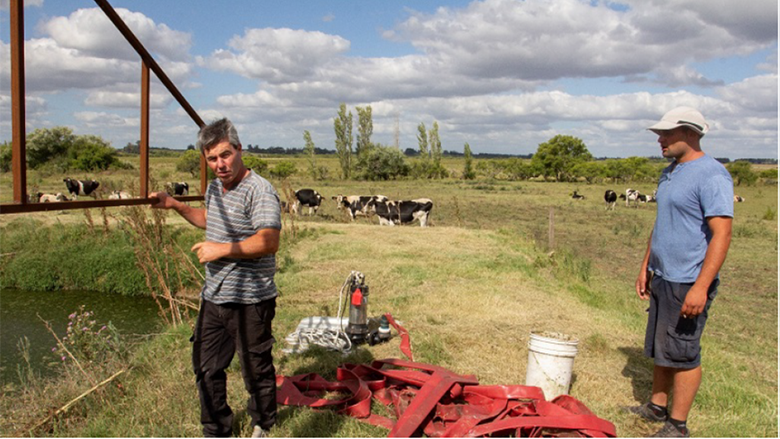Beneficiary Story/Quote
Waste Management for Clean Water and Organic fertilizer in the Santa Lucia watershed.
For Richard Irureta, who farms in the Santa Lucia watershed and has used the waste management pool for four years, the quality and timing of manure application is an improvement over previous “one-off” chemical use.
Richard applies organic fertilizer from the waste management pool to his fields, one hectare at a time, every 15 days: “The soil stays strong all year. The dry organic matter is particularly useful to improve the soil before planting sorghum,” he says. Additional benefits of the systems are seen at the regional level – collectively, these waste management pools reduce harmful effluent runoff into the Santa Lucia watershed, ensuring clean and safe water for those who rely on it.
Challenge
Uruguay is highly vulnerable to climate change. Weather-related shocks, increasing both in frequency and intensity due to climate change, posed a growing threat to the Uruguayan economy. In addition, the country faced growing pressures from anthropogenic activities, including soil degradation and water pollution. In the Santa Lucia watershed, dairy farms contributed 80 percent of water pollution in the most important watershed in the country, which supplies approximately 70 percent of the capital city of Montevideo’s fresh water. At the same time, Uruguay’s agricultural sector was critical to the Uruguayan economy, contributing 7 percent of GDP and 71 percent of total exports.
Approach
DACC launched in 2011 and sought to promote farmer adoption of climate-smart agricultural and livestock practices and improved natural resource management practices nationwide, through technical assistance and subproject financing. DACC financed matching grants to dairy producers for the installation of effluent management systems on dairy farms in the Santa Lucia watershed. DACC invested in information systems to improve public and private decision-making in the agricultural sector, on-farm assets to demonstrate sustainable intensification and scale up its use, and knowledge transfer to improve agricultural practices across the country.
